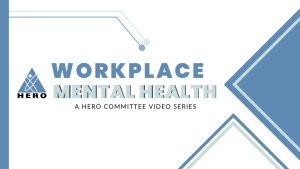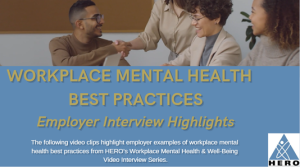“Committee involvement is an excellent benefit to your organization since you are at the forefront on key topics, get recognition in published reports, and get insider ideas from the best in the business. It is also a great way to build deeper relationships with peers in the industry. I encourage every HERO member to prioritize committee involvement, to benefit you, your organization, and the broader industry.” – HERO Committee volunteer
HERO is a member-driven coalition of employers, providers, consultants, academic institutions, and associations who share a belief that Workplace Health and Well-Being (HWB) is a scientifically sound, evidence-based approach to achieving health improvements for their employees.
Further, through the creation and dissemination of evidence-based HWB research, education, and best practices, HERO actively and continually provides leadership critical to advancing the well-being and performance of the nation’s workforce. Much of the good work that HERO does is achieved through the efforts of its volunteer committees. Many of the members of the Think Tank and others in their organizations are involved in committee work. Some members are participating in more than one committee. Three types of HERO committees are active today, HERO Standing Committees, HERO Study Committees, and HERO Ad Hoc Committees.
Attention Student Members! Are you interested in serving as a student representative on a HERO Study Committee? Volunteering to serve is a great way to network with professionals in our field, contribute to HERO research, and share your unique perspective. To learn more, please email info@hero-health.org and include your resume, which Study Committee you’d like to join, and a brief explanation of your interest.
HERO Standing Committees
In co-op fashion, volunteer members provide direction and support to HERO operations via standing committees for Education, Leadership and Research. Our Standing Committees include:
The Education Committee is a group of Think Tank members who have interests and expertise in workplace health and well-being (HWB) education, communication and shared learning. Over the past few years, several factors have converged, which require renewed efforts in the areas of both member and public education. The number of HERO projects and interests has increased significantly, requiring enhanced internal communication with Think Tank Members. At the same time, systems-level changes, including policy efforts that emphasize wellness, increased public awareness of workplace health promotion and corresponding growth in the industry, provide many opportunities for HERO to position itself in an expert role and demonstrate value to employers and the general public. Additionally, new communication technologies have evolved that can facilitate the dissemination of high-level information, enhancing HERO’s already-successful education efforts and extending the shared learning to provide even greater value to both internal and external stakeholders.
The Leadership Committee is comprised of Think Tank members who have special interests and skills in analyzing future workplace health and well-being (HWB) needs and opportunities and suggesting projects that will keep HERO on the cutting edge of the workplace HWB world. This Committee will have a major influence on the future of HERO and the success we will have.
The HERO Research Committee sets the HERO Research Agenda and provides guidance and expertise in making HERO a respected contributor and major player in the creation, publication, and dissemination of unbiased and meaningful workplace health and well-being research and best practices.
HERO Study Committees
Based on member interest surveys, study committees discuss, analyze and research topics to produce reports, presentations, and, often, peer-reviewed journal articles. With HERO members as authors, they are focused on providing understanding and guidance to employers.
Study Committee Chairs: Mary Freire de Carvalho, MPH, PhD, Heidi Greenberger, PhD, MPH, Christopher Pelosi, MPH, and Philip Swayze, MS, CWPD
Our active Study Committees include:
The Workforce Mental Health and Well-Being (WMHW) Committee aims to build on previous committee work exploring ways employers of different sizes, industries, and geographies are developing, implementing, and measuring the success of WMHW strategies. Over the past decade, and particularly in the wake of the COVID-19 pandemic, more employers have prioritized WMHW, and have expanded benefits and programs to meet workforce needs. Despite this progress, many employers continue to face common challenges including identifying the interventions that will be most acceptable and beneficial for their specific workforces, as well as implementing valid yet feasible measurement strategies to evaluate the same. Moreover, it is known that utilization of mental health services remains suboptimal due to personal and system-level barriers, including cultural, geographical, and financial challenges that impact individuals differentially. The committee aims to shine a spotlight on WMHW initiatives across diverse organizational sizes and settings. We are especially interested in those informed by diversity, equity, and inclusion (DEI) and will examine the factors associated with their success in all instances.
Significant evidence exists on the impact of employee health and well-being (HWB) on healthcare costs, workforce productivity, and on the ability of well-designed initiatives, programs, and cultures of health and psychological safety to improve HWB. At the same time, evidence also exists on the organizational value of workplace culture, perceived organizational support, workplace equity and the employee experience in meeting business objectives. It’s expected that organizational success and workforce HWB will increasingly depend on multi-dimensional strategies informed by Social Determinants of Health (SDoH), Diversity, Equity, Inclusion (DEI) and Belonging, Talent Acquisition and Retention, Sustainability, Mental Health, Employee Resource Groups (ERG), and champion networks, thus developing and supporting an employer’s people and culture.
HERO Ad Hoc Committees
Based on current issues and needs, HERO’s ad hoc committees convene and respond accordingly. Our current Ad Hoc Committees include:
This committee builds on the consensus work of HERO, American College of Occupational and Environmental Medicine, American Heart Association, Population Health Alliance, and other organizations concerned about equity and effectiveness in employee wellness. You can find the 2015 consensus response white paper and published paper by following the hyperlinks.
This committee exists to address the evolving needs of HERO members related to the value of benefits and the communication of member benefits. Currently, the committee is reviewing HERO’s new member onboarding process, with the goal of updating and expanding HERO’s onboarding of new member organizations. HERO aims to offer an onboarding experience that helps members maximize their membership experience.
Committee Case Study Video Series
Workplace Mental Health Best Practices: Employer Interview Highlights
Workplace Mental Health
 The Workplace Mental Health and Well-Being Study Committee aims to build on our previous work exploring ways employers are developing and measuring the success of workplace mental health and well-being (MHWB) strategies.
The Workplace Mental Health and Well-Being Study Committee aims to build on our previous work exploring ways employers are developing and measuring the success of workplace mental health and well-being (MHWB) strategies.
Watch on YouTube:
- Shell Oil (WMHW)
HERO Members can log into the HERO Hub to access additional employer video interviews: University of Michigan (EEx), HUB International (EEx), Jackson Healthcare (EEx), Andersen Construction (WMHW), Metro Nashville Public Schools (WMHW), and American Heart Association (WMHW).
If you have questions or would like more information on how your organization could participate in HERO case study interview, please reach out to Karen Moseley at karen.moseley@hero-health.org.

